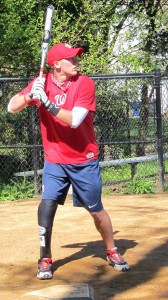WASHINGTON – The Wounded Warrior Amputee Softball Team is remarkable to watch. But that’s not necessarily because they’re amputees.
Sure, it is remarkable to see one-armed outfielders make a catch then toss the ball in the air, drop their gloves, grab the ball and then throw it back in one smooth motion. Or see a leg amputee muscle a triple out of a double. Or see a double-leg amputee dart around the infield making plays.
Watching them play is so remarkable because it’s so much like watching any other ball game. It’s competitive. There’s trash talk. The spitting of seeds. The occasional signed ball with a phone number included.

Army Cpl. Matthew Kinsey of the Wounded Warriors Amputee Softball Team practices at Bethesda-Chevy Chase High School in Bethesda, Md., April 2. The team played a team of Washington celebrities at Nationals Stadium Tuesday, winning 17-4. (Andy Matarrese/Medill News Service)
“By the second or third inning, you almost tend to forget they’re amputees,” said their coach and founder, David Van Sleet.
You can also see the players love it.
“They don’t want this dream to end,” he said.
“They’re being treated like a major league team, and they should be,” he said. Van Sleet served in the Army for two years, then went on to a 30-career working with prosthetics for the Veterans Administration.
The team, composed of current and former Marines and soldiers who have lost limbs, played against a field of Washington celebrities at Nationals Field on Tuesday, winning 17-4.
ESPN’s Tony Reali and D.C. Mayor Vincent C. Gray might not sound like menaces on the diamond, but their teammates included NFL Hall of Famer Darrell Green, former Washington Redskins linebacker LaVar Arrington and Buddy Biancalana of the Word Series Champion Kansas City Royals.
“We got beat badly, man.” Biancalana said. “These guys can play.”
Subhead: ‘They don’t want any sympathy’
Assistant Coach Gary Weaver, a longtime friend of Van Sleet’s, didn’t have an exact number, but guessed the team wins about 60 to 70 percent of their games.
“We’ve had our butts handed to us too,” Weaver said. “The main thing is they are very competitive. They don’t want any sympathy. They just want to compete.”
The team members come from all over the country. They get few chances to practice together, maybe a day before a game. They do most of their training on their own.
“These guys, if there’s a day when they don’t do batting practice, they’re upset,” Van Sleet said.
Army Cpl. Matthew Kinsey, the shortstop, said everyone on the team has some soreness or nagging injury to nurse.
“We have to train just as hard as any other athlete that’s out there still playing now,” he said.
That these guys are so dedicated and competitive was probably connected to their rehabilitation, Van Sleet said.
Many had low odds of surviving their injuries, he explained, much less having normal function in their limbs.
“Playing a sport was the furthest thing from their mind,” he said, but they took their rehabilitation seriously, and were able to have normal lives, then get back to playing sports.
Kinsey was on the tenth month of a 12-month tour in Afghanistan, his second, when he stepped on a land mine during a nighttime patrol and lost his leg.
He said he distinctly remembers getting to the hospital and talking to his brother.
“I said, ‘I don’t know what I’m going to do, man. I’ve been an athlete my whole life and I had no clue.’”
“None of us thought we were going to be athletes again,” he said.
Outfielder Greg Reynolds, a former Army staff sergeant, made it through a tour in Afghanistan only to get in a motorcycle wreck back home.
“They gave me 1-in-2,000 odds for survival,” he said.
Reynolds suffered a brain injury, infection and kidney failure.
“Everything was going against me,” he said. Doctors amputated his left shoulder and arm.
Beyond physical therapy and speech therapy, Reynolds taught himself how to catch with what used to be his off hand.
“I was like a newborn baby all over again,” he said.
The team’s pitcher, former Marine gunnery sergeant Tom Carlo, said the team, as part of its touring, tries to work in stops at Veterans Affairs hospitals to speak with other amputees.
“Anybody can say, you know, ‘You’ll be OK,’” he said. “The doctors can say it, anybody. But when an amputee says, ‘Look, you’ll get through this, man,’ and ‘I’m doing this and I’m doing that’ … it hits home.”
The day before the game in Washington, several members of the team stopped at Walter Reed National Military Medical Center in Bethesda, Md., before holding practice at a local field.
Weaver recalled seeing an amputee working out in the rehabilitation area. When he saw the team, he picked up the pace of his workout.
“These guys are very inspirational. They don’t know it, I don’t think, sometimes,” he said. “They don’t realize how inspirational they are to all of us.”
